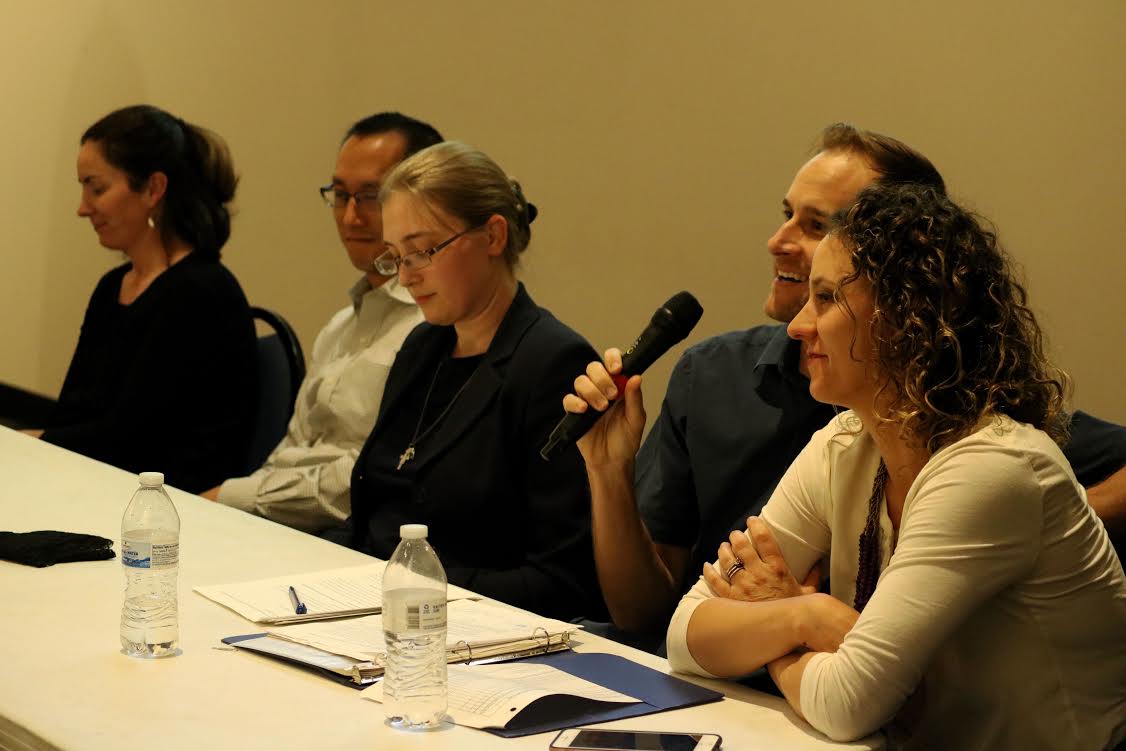On Monday, April 24, SLU Catholic Studies presented their annual presentation and discussion of Natural Family Planning (NFP) to around 100 attendees. The topic of contraception has been debated lately on SLU’s campus and in the SGA chambers. On April 5, SGA passed a resolution recommending the Student Health Center increase access to birth control for students. Although it is the University administration’s choice, the topic is fostering conversation and discussion.
For the third annual NFP night, SLU Catholic Studies held a panel of five speakers to help promote the Jesuit Catholic mission that focuses on glorifying each human person. They emphasized that artificial birth control does not give the inherent dignity due to every man and woman and can be harmful to relationships and women’s health. Some birth control can even act as an abortifacient.
NFP is limiting births by natural means, such as avoiding having sexual intercourse during a woman’s ovulation period, rather than using artificial methods such as medication or condoms. The five panelists were Troy and Emma Woytek, Dr. Cara Buskmiller, Dr. Patrick Yeung and Megan Sustar. The Woytek’s explained their experiences practicing NFP in their marriage; Troy is a campus minister at Washington University in St. Louis and Emma is an attorney. Dr. Buskmiller is a SLU Medical Resident in OB/GYN. She shared her expertise with NFP and gave a background of the process. Dr. Yeung is the Director of SLU Center for Endometriosis and Infertility Care and showed how NFP works and the benefits of it. Sustar is an RN and Natural Family Planning Practitioner; she has personal experience with NFP and assists women going through it currently.
In Dr. Buskmiller’s presentation, she said it is generally only possible for a woman to get pregnant four to seven days out of a month. Inserting something between the working fertility of one person and another person is the definition of artificial means. NFP never puts up a barrier between the working processes of two people. The only compromise is abstaining from sex for a small number of days out of a month. According to Dr. Buskmiller, there is a different mindset in NFP couples; they are open to the thought of having children and participate in sexual intercourse knowing that a pregnancy could occur. She said a change of heart is required if an artificial barrier is used and fails. Instead of rejoicing while looking at the pregnancy test, couples can be disappointed because they were actively avoiding having a child.
The Woyteks have been married for several years and have used NFP throughout their whole marriage. Troy said that his and Emma’s marriage has been enhanced by practicing NFP. There is increased communication between them, and it is a shared experience rather than just Emma figuring out her cycle. They are fully committed to each other and both have ownership over fertility. NFP creates a space for greater love and intimacy that goes beyond just the physical; when people are in the pattern of having sex regularly then it is more difficult to abstain from sex after giving birth (abstinence is required for six to eight weeks). Troy also stressed the value of anticipating sexual intercourse; “You know what’s better than spontaneity? Anticipation. There’s something to be said about knowing on Friday we can have sex then looking forward to that all week.”
Dr. Yeung talked about the Catholic Church’s views on contraception. He said the Church seems to only offer a list of don’ts such as contraception, abortion, premarital sex and adultery. Instead of a no message, chastity, natural family planning, sex and marriage should be a challenge to fullness. There is a love and life connection; babies and bonding go together, likewise the love and life connection cannot be broken. Bonding without babies is contraception; a fertile act is made infertile. Babies without bonding would be in vitro fertilization (IVF), essentially making a baby in a test tube then injecting it inside of the woman. Dr. Yeung said that Pope Pius II said every human has the right to be born out of love, therefore, IVF is not the best method for conception. It is not only expensive and bypasses the couple, but also increases the chance for birth defects and multiple gestation.
Dr. Yeung cautioned against using hormonal birth control. He said it essentially gives the side effects of pregnancy because the medication is attempting to fool the woman’s body that it is already pregnant. Additionally, there is the possibility of liver damage and blood clots. With NFP, there is increased body knowledge, empowerment and no side effects.
Megan Sustar is a registered nurse who went through a NFP course while she was engaged. She asserted that women feel an increased sense of freedom with NFP because they know what is happening to their bodies. Typical OB/GYNs do not learn NFP methods in med school; Sustar shared her difficulty finding a capable doctor who had NFP training, thus encouraging her to become a nurse and share her experience with others. Sustar said a popular misconception is that all couples who practice NFP have large families. In her family, she has four children—all planned. Couples who do NFP just have a different mindset about babies and family, they embrace life instead of preventing it through artificial means.











Sheila Kippley • Apr 28, 2017 at 1:04 pm
This conference expressed concern for women’s health with the use of artificial birth control. And the following statement was made: “NFP is limiting births by natural means.” Why didn’t anyone mention ecological breastfeeding using the Seven Standards? This is God’s way to space or limit births naturally without any charting or abstinence. It is also the healthiest option after birth for both mother and baby. See http://www.NFPandmore.org for more information on this option.
Steve Craig • Apr 28, 2017 at 9:41 am
I thought the article was a fair representation of the event. Thanks Megan.